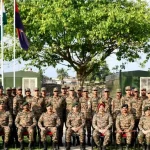In a shocking revelation that has sparked widespread outrage across diplomatic and defence circles, reports have emerged that Pakistan’s Chief of Army Staff, General Asim Munir, has allegedly demanded $10,000 per soldier from Israel or international donors in exchange for Pakistani troop participation in a proposed International Stabilisation Force (ISF) for Gaza. The claim, first highlighted in a Mirror Now video report, has triggered intense debate over whether Pakistan is attempting to “commercialise peacekeeping.”
The controversy comes in the wake of former U.S. President Donald Trump’s 20-point Gaza Peace Proposal, which aims to establish immediate calm and humanitarian stabilisation after months of intense conflict between Israel and Hamas. The centrepiece of Trump’s plan is the creation of a multinational ISF, intended to secure Gaza, oversee reconstruction efforts, and train vetted Palestinian police forces to restore civil order.
While the U.S. plan explicitly excludes American troops, it relies heavily on regional military participation — a condition that, according to reports, Pakistan allegedly responded to with a conditional financial demand. Sources claim that General Munir proposed the deployment of Pakistani soldiers only if Israel or its Western allies agreed to pay $10,000 per deployed soldier as part of a “logistical and operational funding” package.
Monetising Peace or Covering Costs?
The reports have ignited fierce criticism within Pakistan and abroad. Opposition leaders and civil society activists have condemned what they describe as an attempt to “auction the Pakistan Army’s services,” arguing that such a move would “turn the national army into a mercenary force.”
Human rights activists have also expressed concern that the alleged financial conditions undermine Pakistan’s long-standing commitment to United Nations peacekeeping missions, where participation is driven by global responsibility rather than bilateral or transactional deals.
However, defenders of the proposal within Pakistan’s establishment argue that the financial component was not a profit demand, but a cost-recovery mechanism meant to fund deployment logistics, soldiers’ allowances, and post-operation rehabilitation. They maintain that Pakistan’s strained economy and the high risk of deployment in Gaza warrant external financial support.
Strategic Gamble with Diplomatic Consequences
If confirmed, Pakistan’s move could set a new and controversial precedent in global peacekeeping — shifting the model from UN-led missions to commercially negotiated security contracts. Analysts warn this could backfire diplomatically, as Pakistan risks alienating Muslim-majority allies like Turkey, Iran, and Malaysia, who oppose direct cooperation with Israel.
Meanwhile, Israel has not officially commented on the reports, though some Israeli defence sources privately admitted that a multinational Arab-led force could be a preferable alternative to direct Israeli control in Gaza. Egypt and Jordan are reportedly in talks with Washington about the ISF framework, with the UAE also being considered for limited participation.
The United Nations, however, has expressed caution, noting that any peacekeeping deployment outside a formal UN mandate could lead to legal ambiguities and competing national interests, potentially worsening Gaza’s fragile stability.
Reputation at Stake
For Pakistan, the issue cuts deep into its identity as a self-proclaimed champion of the Palestinian cause. Any perception of financial bargaining over peacekeeping could erode public trust and further isolate Islamabad internationally. Analysts suggest that unless the Pakistan Army clarifies its stance, the allegations could harm its credibility and moral standing in the Islamic world.
As the global community awaits clarification, the controversy underscores the complex intersection of economics, geopolitics, and morality in modern peacekeeping efforts. Whether this episode marks Pakistan’s shift toward transactional military diplomacy or simply reflects a misunderstood funding proposal, its diplomatic repercussions are likely to reverberate far beyond Gaza.













